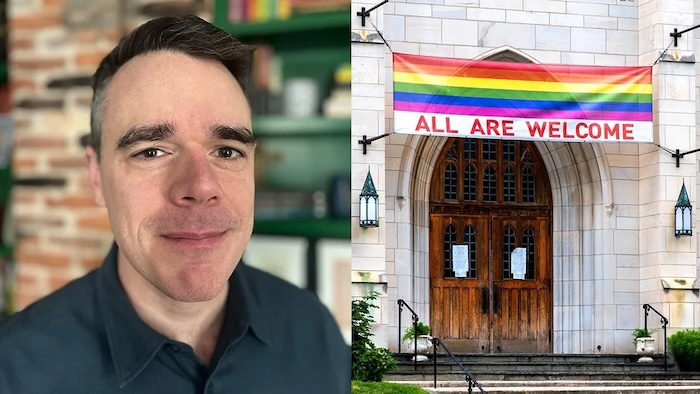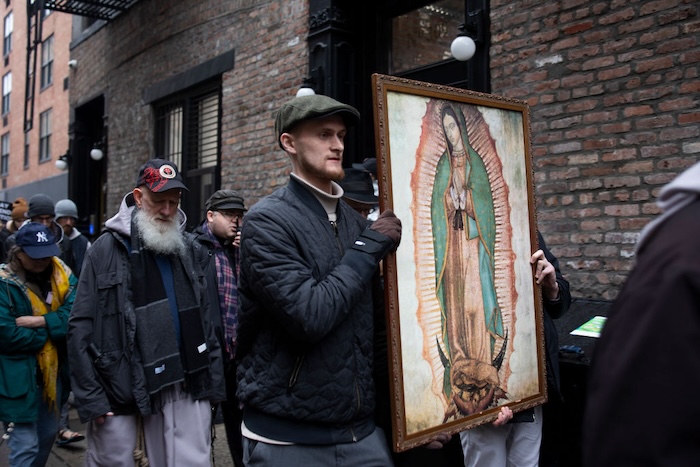— ‘John Doe’ wants punitive damages against church at civil trial claiming abuse by priest and teacher

By
Nearly 50 years after his first day at North Vancouver’s Holy Trinity elementary school, “John Doe” still recalls with pride the buckle shoes he wore as part of a uniform that included a red sweater, white shirt and blue pants.
He was six years old. And it was to be a year of memories Doe has spent a lifetime trying to shake — his father’s death, the sudden switch to a Catholic school, and his rape there by a physical education teacher and the priest who governed Holy Trinity’s operations.
Five decades later, the 55-year-old — whose real name is protected by a publication ban — took the stand in a B.C. Supreme courtroom in New Westminster in a bid to hold the Catholic Church accountable for the actions of Ray Clavin and Father John Kilty.
“It felt very safe. Like something that was missing from my life,” Doe said Monday as he described his initial impressions of Kilty — a man who lived next door to the school.
Children used to go to Kilty’s home at recess. He let them watch him shave. Doe sat in his lap.
“I was extremely fond of him,” Doe said. “I loved Father Kilty.”
‘Kilty ruled over the parish’
During the next four weeks, Doe hopes to convince a judge that the Catholic Church should be held directly liable for the lifetime of suffering Doe claims he has experienced as a result of Clavin and Kilty’s abuse.
The civil trial is unique. The Catholic Church — represented in the proceedings as a legal entity called the Roman Catholic Archbishop of Vancouver — has admitted that the abuse happened and accepted vicarious liability.

But the church denies that it was negligent.
As Doe’s lawyer, Sandy Kovacs, explained in her opening statement, Doe wants Justice Catherine Murray to view him as a “public interest enforcer” — inviting punitive damages against the church for enabling abuse through an ingrained culture that empowered pedophiles.
“Kilty ruled over the parish. Parishioners and teaching staff were submissive to his power and authority,” Kovacs told the judge.
“You will hear that [John Doe] was not Kilty’s only victim.”
‘It’s terrifying in such a dumbfounding way’
A little more than a dozen people packed onto two wooden benches in a fourth floor courtroom to watch Doe take the stand as the trial’s first witness.
He told Kovacs he lost six pounds to stress last week. He said his body temperature was up and down. He sat down, then stood up, complaining of confinement. He said he had an “unscratchable itch” on his leg; he kept leaning over to scratch it all the same.

His memories were fragmentary. Doe said years of therapy had brought him to this moment: “I’m no longer disgusted by how disgusted I am with myself.”
He described Kilty’s abuse during a sleepover in the house next to the school. It was a school night. Kilty invited the boy into his bed. Doe recalled seeing a jar of vaseline.
“I don’t want him to not like me,” he said. “I’m trying, but my body’s completely refusing this.”
Asked about Clavin’s abuse, he remembered the gym teacher shouting at him in a basement. He recalled being in a room without his clothes. And later floating away from his body to watch as Clavin lay on top of him.
“It’s terrifying in such a dumbfounding way,” he said. “To the point of the absurd.”
‘The problem continues’
According to a statement of claim filed in advance of the trial, Clavin was convicted of two counts of sexual assault in the 1990s. Kovacs said his whereabouts today are unknown.
The court documents say that in 2020, the church also acknowledged that Kilty was “credibly accused of historical clergy sexual abuse.”
Kilty died in 1983. Two decades later, the first of several victims stepped forward.
Kovacs said she expects to call a man who was abused by Kilty in 1967 as a witness.
“He will speak to his observations of the teachers and nuns’ behaviour around Father Kilty, and what he describes as a culture of ‘see no evil, hear no evil, speak no evil,'” she said.
The trial is also expected to hear testimony from the bishops of Saskatoon and Prince George, both of whom Kovacs said had been altar boys at Holy Trinity and would bear witness to the relationship between Kilty and Clavin.
Kovacs also said she plans to call expert witnesses to testify about institutional sexual abuse — and particularly abuse within the Catholic Church.
She said one of those witnesses, Thomas Doyle, is a Roman Catholic priest who served with the Vatican embassy in Washington during the 1980s.
“He will tell you that Kilty’s and Clavin’s abuse of children was no anomaly,” Kovacs told the judge.
“Despite countless pronouncements, explanations, assurances, and apologies by the institutional church throughout the world, the problem continues — and the welfare of victims does not appear to be a major concern.”
In a response to Doe’s claim, the Roman Catholic Archbishop of Vancouver has denied direct liability for Kilty and Clavin’s abuse, saying there was no “operational culture” enabling the men to sexually assault children at the school.
Even if such a culture had existed, the church says it “denies that it was complicit in it or otherwise acted negligently as alleged or at all.”
Complete Article ↪HERE↩!








